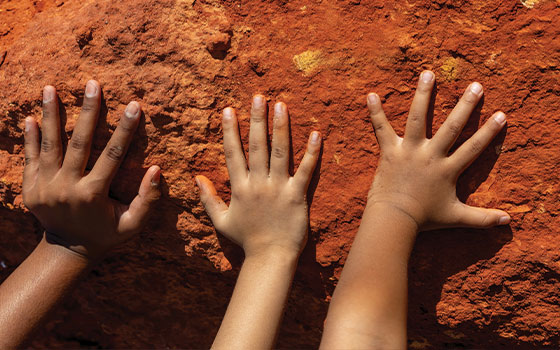Search
Improving the educational experiences of Aboriginal children and young people
The Health of Aboriginal Children and Young People

ACCARE provides high level advice to the Institute's Director around strategic directions and operational elements relating to Aboriginal health research
Research
Understanding the implementation of health checks in the prevention and early detection of chronic diseases among Aboriginal and Torres Strait Islander people in Australia: a realist review protocolChronic disease remains the leading cause of morbidity and mortality among Aboriginal and Torres Strait Islander peoples in Australia. Regular structured, comprehensive health assessments are available to Aboriginal and Torres Strait Islander people as annual health checks funded through the Medicare Benefits Schedule.
Research
Histo-blood group antigen profile of Australian Aboriginal children and seropositivity following oral rotavirus vaccinationHisto-blood group antigens (HBGAs) may influence immune responses to rotavirus vaccination.
Research
The impact of diabetes during pregnancy on neonatal outcomes among the Aboriginal population in Western Australia: a whole-population studyAboriginal and Torres Strait Islander (hereafter Aboriginal) women have a high prevalence of diabetes in pregnancy (DIP), which includes pre-gestational diabetes mellitus (PGDM) and gestational diabetes mellitus (GDM). We aimed to characterize the impact of DIP in babies born to Aboriginal mothers.
Research
First Nations populations' perceptions, knowledge, attitudes, beliefs, and myths about prevention and bereavement in stillbirth: a mixed methods systematic review protocolThe objective of this review is to investigate First Nations populations' perceptions, knowledge, attitudes, beliefs, and myths about stillbirth.
Research
The Health Outcomes and Health Service Needs of the Martu and Nyiyaparli People of Northwest Western Australia: A Grey Literature ReviewHealth outcomes for Australian Aboriginal and Torres Strait peoples are very poor. This is considerably worse in remote regions. The East Pilbara, where the Aboriginal and Torres Strait Islander communities of the Martu and Nyiyaparli people reside, is one such remote region.
Research
Evaluation of the implementation and clinical effects of an intervention to improve medical follow-up and health outcomes for Aboriginal children hospitalised with chest infectionsAboriginal children hospitalised with acute lower respiratory infections (ALRIs) are at-risk of developing bronchiectasis, which can progress from untreated protracted bacterial bronchitis, often evidenced by a chronic (>4 weeks) wet cough following discharge. We aimed to facilitate follow-up for Aboriginal children hospitalised with ALRIs to provide optimal management and improve their respiratory health outcomes.
Research
A pilot study to develop assessment tools for Group A Streptococcus surveillance studiesGroup A Streptococcus (GAS) causes pharyngitis (sore throat) and impetigo (skin sores) GAS pharyngitis triggers rheumatic fever (RF) with epidemiological evidence supporting that GAS impetigo may also trigger RF in Australian Aboriginal children. Understanding the concurrent burden of these superficial GAS infections is critical to RF prevention. This pilot study aimed to trial tools for concurrent surveillance of sore throats and skins sore for contemporary studies of RF pathogenesis including development of a sore throat checklist for Aboriginal families and pharynx photography.
